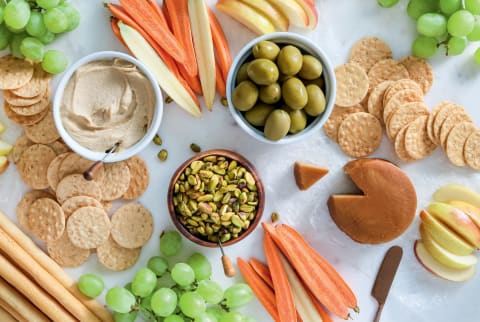Advertisement
6 Ingredients To Avoid In "Healthy" Snack Foods, From A Functional Nutrition Expert


In my telehealth functional medicine clinic, one of the biggest things I work on with my patients is how to make healthier choices at the grocery store.
Whether you are new to the well-being community or a longtime member, you may not realize that it's not enough to take brands at face value. In fact, I've found most "clean," "healthy," "organic," and "natural" snacks and foods are far from nutritious.
So regardless of what the label claims, it's always important to check out the ingredient list. This is a situation in which knowledge is power. Here's a crash course in translating both labels and food ingredients so you can buy and eat with confidence.
Snack food ingredients I avoid.
Based on research and my own experiences, these are some ingredients I generally advise my clients to avoid when possible:
Gluten
There is no "one-size-fits-all" rule about gluten or any other food, for that matter. But studies have shown that you can still react to gluten even if you aren't diagnosed with celiac disease. In fact, celiac disease is often the end-stage of what is known as the gluten-sensitivity spectrum1. And even if gluten is not necessarily your main issue, there are about 24 different qualities in wheat that can cause reactivity. My advice? Opt for one of the many grain-free snack options on the market.
Refined & artificial sugar
As you know, sugar has been linked to everything from obesity to diabetes. While there's nothing wrong with having something sweet on occasion, most snacks are filled with unnecessary sugar, even those that aren't necessarily classified as desserts.
But it's not enough to make the switch to artificial sweeteners like aspartame or sucralose either. These sound like a good idea at first—after all, you get to get rid of the calories while still enjoying something sweet—but studies have found they're just as bad, if not worse2, for your health because they can change up the composition of your microbiome and potentially lead to metabolic health problems. Some healthier options include stevia, honey, maple syrup, monk fruit, xylitol, dates, pure maple syrup, and organic coconut sugar.
Dairy
Here's the thing with dairy: I don't believe dairy is inherently bad; it's what we've done to dairy that is the problem. Cows on most major dairy farms today are given hormones and antibiotics, live in unhealthy conditions, and are fed corn instead of grass. Their milk is then pasteurized and homogenized. To make up for nutrient loss, synthetic vitamins are then injected into the milk, trying to stimulate what nature had already included in the whole-food form.
In my functional medicine practice, I've found this can lead to an onslaught of inflammation and other sensitivities to dairy. Needless to say, there are a lot of reasons to avoid dairy. However, if you know you can handle dairy and find a brand that uses organic, grass-fed dairy, I say go for it!
Preservatives
What are preservatives, really? Ultimately, they are chemicals and other toxins that build up and wreak havoc on our health. Our genetics have not changed for thousands of years, but the onslaught of chemicals we come across on a daily basis certainly has. We are not designed to handle these preservatives, and it shows through the rise of autoimmune and other chronic health issues.
Food dyes
Between 1950 and 2012, the use and intake of artificial food dyes increased from 12 milligrams to 68 milligrams per day. In some studies, just 50 milligrams of food dyes a day have even been linked to increased symptoms of ADHD3. Here are some of the food dyes and additives I recommend looking out for:
- FD&C Yellow No. 6: found in cereal, candy, and soft drinks
- FD&C Yellow No. 5: found in cereal, pickles, and granola bars
- D&C Yellow No. 1: found in juices and frozen desserts
- FD&C Red No. 40: found in candy, soft drinks, and even children's over-the-counter medications
- FD&C Blue No. 1 and No. 2: found in candy, sports drinks, and cereals
- FD&C Green No. 3: found in candy, sports drinks, cereals, and ice cream
Industrial seed oils
On the top of my list are industrial seed oils, which are ingredients in just about every boxed food that's marketed as "healthy." Oils like canola, vegetable, soybean, and corn oils are so ubiquitous in your food system because they come mostly from government-subsidized crops, which makes them cheap and plentiful. The problem with these oils is that they are extremely high in omega-6 polyunsaturated fats (PUFA).
While omega-6s aren't inherently bad, when we have too many omega-6s compared to omega-3s, that becomes a major problem. In this case, the omega-6s mess with the anti-inflammatory properties of omega-3s, which can result in inflammation in the body.
These oils are also highly processed, often with industrial solvents. I barely consider them to be food. Instead, look for snacks made with coconut oil and avocado oil.
The takeaway.
You don't want your labels to look like a chemistry project. Less is more when it comes to ingredients, and you should be able to recognize every ingredient as something from the earth.

Will Cole, IFMCP, DNM, D.C., is a leading functional medicine expert who consults people around the globe, starting one of the first functional medicine telehealth centers in the world. Named one of the top 50 functional and integrative doctors in the nation, Dr. Will Cole provides a functional medicine approach for thyroid issues, autoimmune conditions, hormonal imbalances, digestive disorders, and brain problems. He is the host of the popular The Art Of Being Well podcast and the New York Times bestselling author of Intuitive Fasting, Ketotarian,The Inflammation Spectrum, and Gut Feelings.
More from the author:
Functional Nutrition Training
Check out Functional Nutrition Coaching
A cutting-edge nutrition deep dive taught by 20+ top health & wellness experts
Learn moreMore from the author:
Functional Nutrition Training
Check out Functional Nutrition Coaching
A cutting-edge nutrition deep dive taught by 20+ top health & wellness experts
Learn more
Will Cole, IFMCP, DNM, D.C., is a leading functional medicine expert who consults people around the globe, starting one of the first functional medicine telehealth centers in the world. Named one of the top 50 functional and integrative doctors in the nation, Dr. Will Cole provides a functional medicine approach for thyroid issues, autoimmune conditions, hormonal imbalances, digestive disorders, and brain problems. He is the host of the popular The Art Of Being Well podcast and the New York Times bestselling author of Intuitive Fasting, Ketotarian,The Inflammation Spectrum, and Gut Feelings.